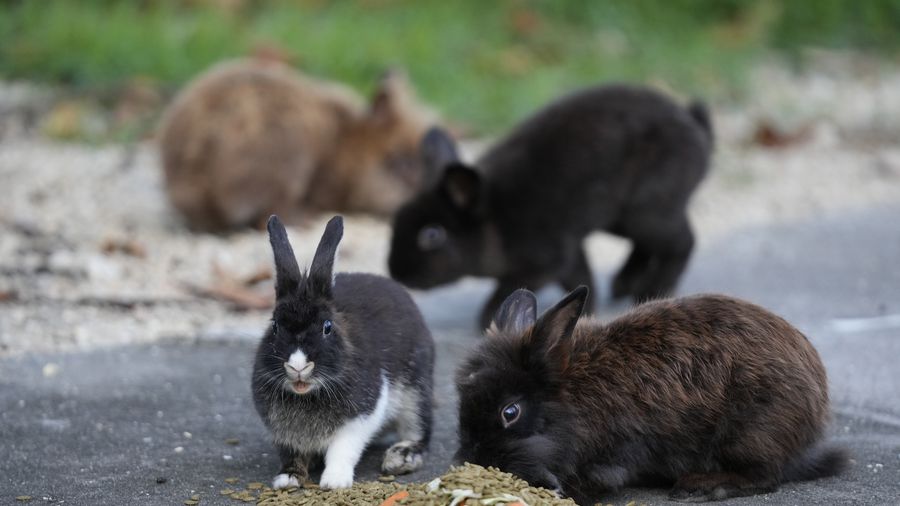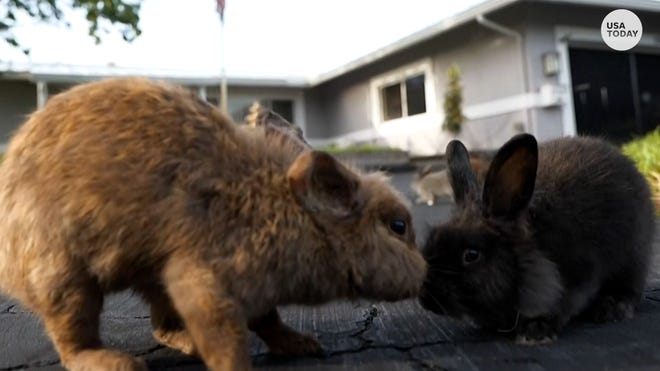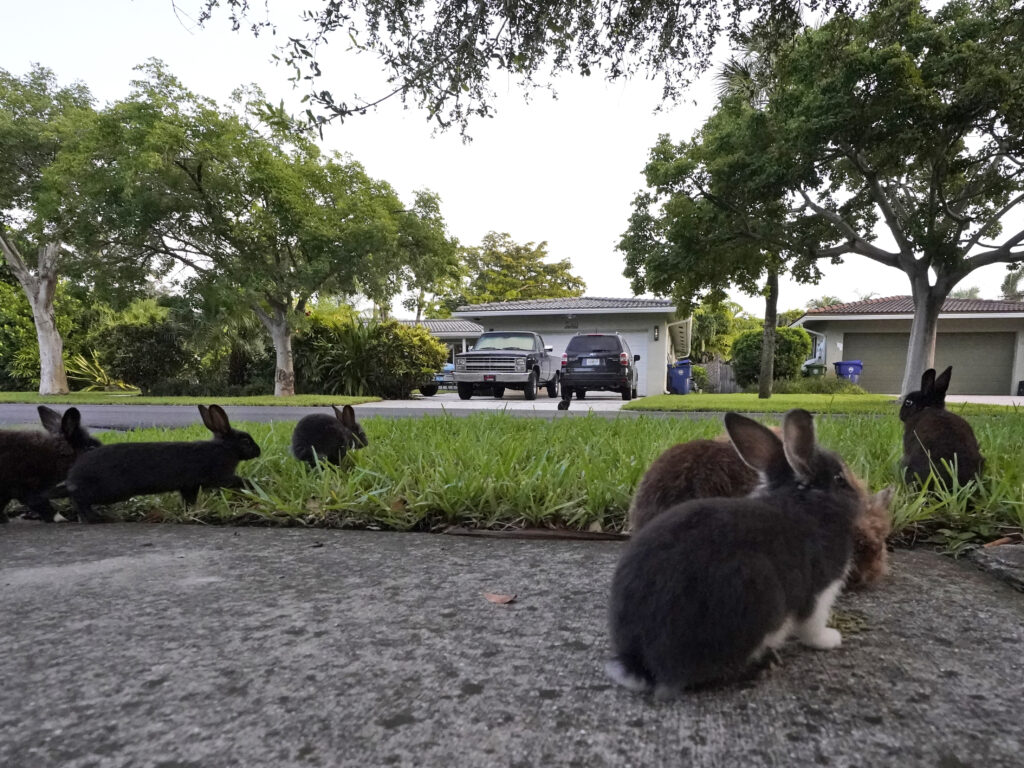Lionhead rabbits have taken over a neighborhood in Florida, and residents are seeking help to “rescue” them. The group of rabbits, estimated to range between 60 and 100, were introduced to the area by a backyard breeder who allegedly released them two years ago. Homeowners are facing numerous issues, including holes in their yards, chewed outdoor wiring, and road hazards caused by the rabbits. Additionally, the rabbits’ thick coats make them susceptible to overheating in Florida’s summers, and their digestive systems require a specific diet. A Fort Lauderdale real estate agent, Alicia Griggs, is leading efforts to raise the necessary funds for their rescue, as the local government initially voted to exterminate the rabbits.
Lionhead Rabbits Taking Over a Florida Community: How to Help ‘Rescue’ Them
Lionhead rabbits, with their distinctive wool mane wrapping around their heads, are a domestic breed of rabbits that have recently become a nuisance in a Florida community. These small rabbits, weighing between 2.5 and 3.75 pounds, have taken over Janada Isles, an 81-home community in the city of Wilton Manors. The presence of the lionhead rabbits has caused problems for the homeowners, including digging holes, chewing outdoor wiring, and becoming traffic hazards. Moreover, the Florida environment is not suitable for these rabbits, as their thick coats make them prone to overheating, and they struggle to find the necessary nutrients for their complicated digestive systems. In an effort to address this issue, Alicia Griggs, a Fort Lauderdale real estate agent and resident, is leading the charge to raise funds and rescue these lionhead rabbits. In this article, we will explore what lionhead rabbits are, where they can be found in Florida, why they need to be removed, what is being done to remove them, and how individuals can contribute to the rescue efforts.

What are lionhead rabbits?
Lionhead rabbits are a domestic breed of rabbits known for their distinctive wool mane that resembles that of a male lion, hence the name. These rabbits are small in size, weighing between 2.5 and 3.75 pounds, and are typically well-furred. They require special care due to their unique characteristics and physical traits.
Lionhead rabbits have a playful and friendly nature, making them well-suited as pets. They are known for their intelligence and can be trained to perform tricks and use a litter box. Additionally, these rabbits have a longer lifespan compared to other breeds, averaging between seven to nine years. However, their thick coats can make them vulnerable to heatstroke, especially in hot and humid environments.
To properly care for lionhead rabbits, owners need to provide them with a balanced diet that includes fresh vegetables, high-quality pellets, and hay. Regular grooming is also essential to prevent matting and fur blockage. Overall, lionhead rabbits require special attention and care to ensure their well-being.
Where can the lionhead rabbits be found in Florida?
The colony of lionhead rabbits has taken up residence in Janada Isles, a picturesque 81-home community located in the city of Wilton Manors, Florida. Wilton Manors is a small city with a population of approximately 11,316 people, situated in Broward County as part of the Miami metropolitan area. The community is known for its serene environment and close-knit residents.
Janada Isles, previously a peaceful neighborhood, has seen a rapid increase in the population of lionhead rabbits. Their presence has disrupted the tranquility of the community, with residents experiencing damage to their yards, outdoor wiring, and encountering the rabbits as traffic hazards. The colony has become a source of concern for both residents and local authorities, prompting efforts to remove the rabbits from the area.

Where did the lionhead rabbits come from?
The lionhead rabbits currently occupying Janada Isles are believed to be descendants of a group of lionheads that were left behind by a former resident who moved away. Allegedly, a backyard breeder released the rabbits when she relocated approximately two years ago, leading to the establishment of the colony.
The backyard breeder’s decision to release the rabbits had unintended consequences, as the rabbits multiplied and adapted to their newfound habitat. With no natural predators in the area, the population of lionhead rabbits continued to grow, resulting in the current situation faced by the community.
Why do the lionhead rabbits need to be removed?
The lionhead rabbits in Janada Isles pose various challenges and risks that necessitate their removal from the community. While they may not pose the same threats as invasive species like Burmese pythons or lionfish, their presence has become a nuisance to homeowners.
Homeowners in Janada Isles have reported numerous issues caused by the lionhead rabbits. These include damage to their yards due to extensive digging, chewing of outdoor wiring leading to potential hazards, and even instances of the rabbits becoming road hazards. If left unchecked, the colony’s continued breeding could exacerbate these issues and spread them throughout the community.
Moreover, the Florida environment is not suitable for lionhead rabbits’ well-being. Their thick coats make them susceptible to heatstroke, particularly in the stifling summers of Florida. The rabbits also struggle to find adequate nutrition suitable for their complicated digestive systems. Without proper care and access to suitable resources, their health and lifespans are at risk. Additionally, as non-native species, they lack the natural fears of local predators, making them easy targets and further endangering their survival.
Considering these factors, removing the lionhead rabbits from Janada Isles is crucial to preserving the community’s well-being and ensuring the rabbits’ welfare.

What’s being done to remove the lionhead rabbits in Florida?
Recognizing the need to address the lionhead rabbit issue, Alicia Griggs, a Fort Lauderdale resident and real estate agent, has taken the initiative to spearhead the rescue efforts. Griggs is working tirelessly to raise funds amounting to $20,000 to $40,000, which would cover the costs associated with capturing, neutering, vaccinating, sheltering, and eventually rehoming the rabbits.
To accomplish their goal, Griggs and her supporters are collaborating with the officials of Wilton Manors, the city where Janada Isles is located. Initially, the city commissioners voted to exterminate the rabbit colony, as they had received an $8,000 estimate from a trapping company. However, Griggs and other advocates have convinced the city to explore alternative solutions that prioritize the rescue and relocation of the rabbits.
The East Coast Rabbit Rescue, an organization experienced in rabbit rescue and rehabilitation, is expected to play a pivotal role in the rescue efforts. If the necessary funds are raised, they would lead the capture and relocation process in coordination with Griggs and the local authorities.
Griggs and the East Coast Rabbit Rescue have made significant progress in their fundraising initiatives. As of now, they have raised $7,249 out of the targeted $40,000 through a dedicated GoFundMe page established by the rescue group. This promising start demonstrates the community’s commitment to resolving the issue and ensuring the well-being of the lionhead rabbits.
How you can help rescue the lionhead rabbits
Individuals interested in supporting the rescue efforts for the lionhead rabbits have several impactful ways to contribute. Whether through fostering, monetary donations, or supplying much-needed resources, everyone can play a role in making a difference.
Foster
Those who are willing and able to provide a temporary home for the lionhead rabbits can contribute by becoming foster parents. Fostering involves providing a safe and nurturing environment for the rabbits until they can be permanently rehomed. To express interest in fostering, individuals can send an email to the East Coast Rabbit Rescue at RabbitSavior@aol.com with the subject line “I want to foster.” The rescue group will provide foster families with all the necessary supplies to care for the rabbits. It is important to note that foster families should be located in the West Palm Beach area to enable easy access to veterinary visits for the bunnies.
Donate money
For those who are unable to foster but still wish to support the rescue efforts financially, donating money is another valuable option. Contributions can be made through the official GoFundMe page established by the East Coast Rabbit Rescue. Interested individuals can access the page by visiting the GoFundMe website and searching for the “Lionhead Rabbit Rescue” campaign. Alternatively, direct donations can be made through PayPal (contact@eastcoastrabbitrescue.org), Zelle (ecrrfl@gmail.com), Venmo (ecrrfl@gmail.com), and CashApp ($ECRRWPB). Every donation, regardless of the amount, contributes to the overall funding needed to successfully rescue and care for the lionhead rabbits.
Donate supplies
Individuals who prefer to contribute tangible items can do so by donating supplies to the East Coast Rabbit Rescue. The rescue group has compiled an Amazon wish list that features specific items needed for the care and well-being of the rabbits. The wish list includes essential items such as food, bedding, hay, and more. To access the list and make a donation, interested individuals can visit the Amazon website and search for the East Coast Rabbit Rescue’s wish list.
By embracing these various methods of support, individuals can join the collective effort to rescue the lionhead rabbits and ensure they receive the care they urgently need.

Foster
Becoming a foster parent for a lionhead rabbit is a rewarding and compassionate way to contribute to their rescue and rehabilitation process. Fostering enables individuals to provide temporary homes for the rabbits and offer them a safe refuge until permanent placements can be arranged.
To become a foster parent for a lionhead rabbit, there are specific steps and requirements to be aware of:
-
Express interest: Individuals who wish to become foster parents can contact the East Coast Rabbit Rescue by sending an email to RabbitSavior@aol.com with the subject line “I want to foster.” This initial step allows the rescue group to gauge the availability and suitability of potential foster homes.
-
Application and screening: Once the desire to foster has been expressed, prospective foster parents will need to complete an application form provided by the rescue group. This application helps gather important information about the individual’s experience with rabbit care and their living arrangements. Additionally, a screening process, such as an interview and a home visit, may be conducted to ensure the suitability of the environment for fostering.
-
Orientation and training: As a part of the fostering process, individuals will receive orientation and training from the East Coast Rabbit Rescue. This training provides valuable insights into the proper care and handling of lionhead rabbits, helping foster parents understand their unique needs and behaviors.
-
Provision of supplies: The rescue group will supply foster families with all the necessary items required to care for the rabbits. These supplies typically include food, bedding, litter, toys, and any specialized equipment or medication the rabbits may need.
-
Veterinary care responsibilities: Foster parents are responsible for monitoring and maintaining the health of the rabbits under their care. This includes scheduling and attending veterinary appointments, ensuring the rabbits receive necessary vaccinations, and administering any prescribed medications or treatments.
By fulfilling these responsibilities and providing a nurturing home, foster parents play a vital role in the recovery and well-being of the rescued lionhead rabbits.
Donate money
Monetary donations are a crucial form of support for the rescue efforts aimed at the lionhead rabbits in Florida. These funds contribute directly to covering the expenses associated with rescuing, caring for, and finding suitable homes for the rabbits.
To donate money and help rescue the lionhead rabbits, individuals have multiple options:
-
Official GoFundMe page: The East Coast Rabbit Rescue has established an official GoFundMe page specifically for the lionhead rabbit rescue. Donations made through this page go directly towards the rescue efforts. Interested individuals can access the GoFundMe page by searching for “Lionhead Rabbit Rescue” on the GoFundMe website.
-
Direct donation options: Apart from the GoFundMe page, the East Coast Rabbit Rescue also accepts direct donations through various platforms. Monetary contributions can be made using PayPal by sending funds to contact@eastcoastrabbitrescue.org. Additionally, donations can be made through Zelle by sending funds to ecrrfl@gmail.com, Venmo by sending funds to ecrrfl@gmail.com, and CashApp by sending funds to $ECRRWPB. These direct donation methods ensure that funds reach the rescue group promptly, enabling them to continue their vital work.
Every donation, regardless of the amount, directly aids in the rescue and care of the lionhead rabbits, allowing them to be given a second chance at a safe and fulfilling life.

Donate supplies
Donating supplies is another meaningful way to support the lionhead rabbit rescue efforts led by the East Coast Rabbit Rescue. These donations help provide the necessary resources for the rabbits’ care, ensuring their well-being during their rehabilitation process.
The East Coast Rabbit Rescue has compiled an Amazon wish list, featuring various items required for the rabbits’ proper care. Donors can access this wish list on the Amazon website, which includes essential items such as appropriate food, bedding, hay, toys, and other necessary supplies. By purchasing items from the wish list, individuals can effectively contribute to the ongoing care and comfort of the rescued lionhead rabbits.
To find and access the East Coast Rabbit Rescue’s wish list on Amazon, individuals can search for “East Coast Rabbit Rescue Wish List” within the Amazon website. The wish list items are selected directly by the rescue group, ensuring that the donated supplies match the specific needs of the lionhead rabbits.
By participating in this supply donation initiative, individuals provide tangible support that directly benefits the rabbits’ physical and emotional well-being during their journey to recovery.
In conclusion, the lionhead rabbits that have invaded Janada Isles, a Florida community, require immediate rescue and relocation. Their presence poses challenges and risks to both the homeowners and the rabbits themselves. Spearheading the rescue efforts, Alicia Griggs and the East Coast Rabbit Rescue are working tirelessly to raise funds and coordinate the necessary steps to rescue, care for, and find suitable homes for the lionhead rabbits. Through fostering, monetary donations, and supplying essential resources, individuals can actively contribute to the well-being and successful rescue of these unique and vulnerable rabbits. Together, the community can ensure a brighter future for the lionhead rabbits and restore peace to Janada Isles.

